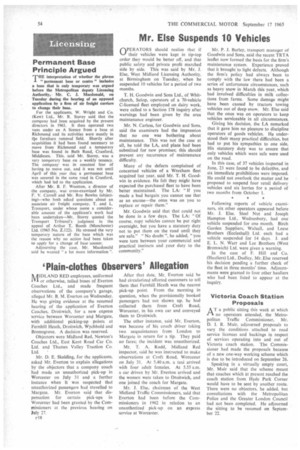Permanent Base Principle Argued
Page 56

If you've noticed an error in this article please click here to report it so we can fix it.
THE interpretation of whether the phrase "permanent base or centre" includes a base that is only temporary was argued before the Metropolitan deputy Licensing Authority, Mr. C. J. Macdonald, on Tuesday during the bearing of an opposed application by a firm of air freight carriers to change their base.
For the applicants, W. Wright and Co. (Kew) Ltd., Mr. R. Storey said that the company had been acquired by the present directors in 1963. It then operated two vans under an A licence from a base at Richmond and its activities were mostly in tbe furniture removal field. Shortly after acquisition it had been found necessary to move from Richmond and a temporary base was found in Bath Road, Cranford, Middlesex. This. said Mr. Storey, was a very temporary base on a weekly tenancy. The company was in constant fear of having to move out, and it was not until April of this year that a permanent base was secured in the same road in Cranford, which had led to the application.
After Mr. B. F. Wootton, a director of the company, was cross-examined by Mr. F. V. Carroll and Mr. Roy Bowles (objecting)—who both asiced questions about an associate air freight company, T. and L Transport, under whose name a considerable amount of the applicant's work had been undertaken—Mr. Storey quoted the Transport Tribunal's judgment in the appeal of Arthur T. Booth (Manchester) Ltd. (1963 No. Z.122). He stressed the very temporary nature of the base which was the reason why no action had been taken to apply for a change of base sooner.
Adjourning the case, Mr. Macdonald said he wanted " a lot more information ".




















































































































































































